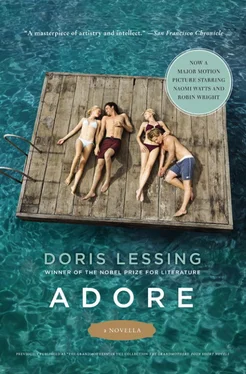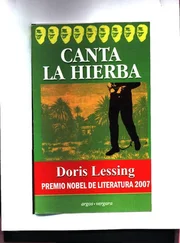‘Well, what’s got into her , I wonder?’ mused Theresa, at last leaving her window to take the tray to by now surely impatient customers. Mary Struthers was hardly moving at all. She stood staring at her family, frowning. Roz Struthers saw her and waved, and then again, and while her hand slowly lowered itself, as if caution had made an announcement, her face was already beginning to lose its gloss and glow. She was looking, but as it were indirectly, at her daughter-in-law, and because of what her face was saying, her son Tom turned to look, then wave. Ian, too, waved. Both men’s hands fell, as Roz’s had done; there was fatality in it.
Mary had stopped. Near her was a table and she collapsed into a chair. Still she stared at Lil, and then at Tom, her husband. From one face to the other those narrowed accusing eyes moved. Eyes that searched for something. In her hand was a packet. Letters. She sat perhaps ten feet away, staring.
Theresa, having dealt with her other tables, was in her window again, and she was thinking accusing thoughts about Mary, this wife of a son, and she knew it was jealousy. She defended herself thus: But if she was good enough for them, I wouldn’t mind her. She’s just nothing compared to them.
Only the eye of jealousy could have dismissed Mary, who was a striking, attractive, dark young woman. She wasn’t pretty now; her face was small and putty-coloured and her lips were thin. Theresa saw the bundle of letters. She saw the four people at the table. As if they were playing statues, she thought. Light was draining away from them. The splendid afternoon might be brazening it all out but they sat struck, motionless. And still Mary stared, now at Lil, or Liliane, now at Roz or Rozeanne; from them to Tom, and to Ian, and then around again, and again.
From an impulse Theresa did not recognise in herself she poured water from the jug in the fridge into a glass, and ran across with it to Mary. Mary did turn her head slowly to frown into Theresa’s face, but did not take the glass. Theresa set it down. Then Mary was attracted by the glitter of the water, reached out her hand for the glass, but withdrew it: her hand was shaking too hard to hold a glass.
Theresa went back to her window. The afternoon had gone dark for her. She was trembling too. What was the matter? What was wrong? Something was horribly, fatally wrong.
At last Mary got up, with difficulty, made the distance to the table where her family sat, and let herself subside into a chair that was away from them: she was not part of them.
Now the four were taking in that bundle of letters in Mary’s hand.
They sat quite still, looking at Mary. Waiting.
It was for her to speak. But did she need to? Her lips trembled, she trembled, she appeared to be on the verge of a faint, and those young clear accusing eyes moved still from one face to another. Tom. Lil. Roz. Ian. Her mouth was twisted, as if she had bitten into something sour.
‘What’s wrong with them, what’s wrong?’ thought Theresa, staring from her window, and whereas not an hour ago she had decided she could never leave this coast, this scene of pleasantness and plenitude, now she thought, I must get away. I’ll tell Derek, no. I want to get out.
Alice, the child on Roz’s lap, woke with a cry, saw her mother there, ‘Mummy, Mummy,’ – and held out her arms. Mary managed to get up, steadied herself around the table on the backs of chairs, and took Alice.
Now it was the other little girl, waking on Lil’s lap. ‘Where’s my mummy?’
Mary held out her hand for Shirley and in a moment both children were on her knees.
The little girls felt Mary’s panic, her anger, sensed some kind of fatality, and now tried to get back to their grandmothers. ‘Granny, Granny,’ ‘I want Granny.’
Mary gripped them both tight.
On Roz’s face was a small bitter smile, as if she exchanged confirmation of some bad news with someone deep inside herself.
‘Granny, are you coming to fetch me tomorrow for the beach?’
And Alice, ‘Granny, you promised we would go to the beach.’
And now Mary spoke at last, her voice shaking. All she said was, ‘No, you will not be going to the beach.’ And, direct to the older women, ‘You will not be taking Shirley and Alice to the beach.’ That was the judgement and the sentence.
Lil said tentatively, even humbly, ‘I’ll see you soon, Alice.’
‘No you won’t,’ said Mary. She stood up, a child on either hand, the bundle of letters thrust into the pocket of her slacks. ‘No,’ she said wildly, the emotion that had been poisoning her at last pulsing out. ‘No. No, you won’t. Not ever. You will not ever see them again.’
She turned to go, pulling the children with her.
Her husband Tom said, ‘Wait a minute, Mary.’
‘No.’ Off she went down the path, as fast as she could, stumbling and pulling the children along.
And now surely these four remaining, the women and their sons, should say something, elucidate, make things clear? Not a word. Pinched, diminished, darkened, they sat on, and then at last one spoke. It was Ian who spoke, direct to Roz, in a passionate intimacy, wild-eyed, his lips stiff and angry.
‘It’s your fault,’ he said. ‘Yes, it’s your fault. I told you. It’s all your fault this has happened.’
Roz met his anger with her own. She laughed. A hard angry bitter laugh, peal after peal. ‘My fault,’ she said. ‘Of course. Who else?’ And she laughed. It would have done well on the stage, that laugh, but tears poured down her face.
Out of sight down the path, Mary had reached Hannah, the wife of Ian, who had been unable to face the guilty ones, at least not with Mary, whose rage she could not match. She had let Mary go up by herself and she waited here, full of doubt, misery and reproaches that were beginning to bubble up wanting to overflow. But not in anger, no, she needed explanations. She took Shirley from Mary, and the two young women, their children in their arms, stood together on the path, just outside a plumbago hedge that was the boundary for another café. They did not speak, but looked into each other’s faces, Hannah seeking confirmation, which she got. ‘It’s true, Hannah.’
And now, the laughter. Roz was laughing. The peals of hard laughter, triumphant laughter, was what Mary and Hannah heard, each harsh loud peal lashed them, they shrank away from the cruel sounds. They trembled as the whips of laughter fell.
‘Evil,’ Mary pronounced at last, through lips that seemed to have become dough or clay. And as Roz’s final yells of laughter reached them, the two young women burst into tears and went running away down the path, away from their husbands, and their husbands’ mothers.
Two little girls arrived at the big school on the same day, at the same hour, took each other’s measure, and became best friends. Little things, so bravely confronting that great school, as populous and busy as a supermarket, but filled with what they already knew were hierarchies of girls they felt as hostile, but here was an ally, and they stood holding hands, trembling with fear and their efforts to be brave. A great school, standing on its rise, surrounded by parkland in the English manner, but arched over by a most un-English sky, about to absorb these little things, babies really, their four parents thought – enough to bring tears to their eyes! – and they did.
They were doughty, quick with repartee, and soon lived down the bullying that greeted new girls; they stood up for each other, fought their own and each other’s battles. ‘Like sisters,’ people said, and even, ‘Like twins.’ Fair, they were, with their neat gleaming ponytails, both of them, and blue-eyed, and as quick as fishes, but really, if you looked, not so alike. Liliane – or Lil – was thin, with a hard little body, her features delicate, and Rozeanne – Roz – was sturdier, and where Lil regarded the world with a pure severe gaze, Roz found jokes in everything. But it is nice to think, and say, ‘like sisters’, ‘they might be twins’; it is agreeable to find resemblances where perhaps none are, and so it went on, through the school terms and the years, two girls, inseparable, which was nice for their families, living in the same street, with parents who had become friends because of them, as so often happens, knowing they were lucky in their girls choosing each other and making lives easy for everyone.
Читать дальше
Конец ознакомительного отрывка
Купить книгу











